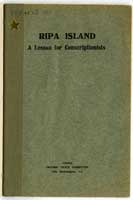 We've recently digitised a very interesting publication that shows a different side to military service than the one we're used to seeing.
We've recently digitised a very interesting publication that shows a different side to military service than the one we're used to seeing.
In 1912, military training or "drills" were compulsory for boys from 14 years of age. Refusal to attend training, even on religious grounds, was considered a serious infringement that could result in confinement at a fortress for a period of 28 days. There were other potential consequences too.
In addition to imposing a fine at the beginning of this process, the magistrate may, and frequently does, declare the offender, for any period up to ten years, ineligible to be employed in the public service, or to vote at a Parliamentary election. The Education Department also takes a hand, and deprives the boy who has not done his drills of any scholarship which he may have won.
Pretty harsh stuff for teenagers to have to contemplate.
Published in London in 1913 by the "Friends' Peace Committee" and written by "passive resister" Samuel Veale Bracher, Ripa Island: A lesson for conscriptionists tells the story of 13 youths from Christchurch and the West Coast who refused military training and were subsequently imprisoned in Fort Jervois on Ripapa (Ripa) Island . Bracher uses the story of the Ripa martyrs as a plea against conscription in Britain.
Initially the boys are treated well and are happy to do manual work that is set them by the officer in charge, but when they refuse to clean guns and take part in military drills, and are subsequently punished with half rations they go on a hunger strike.
At about 3.15 p.m., Bombardier Moir and the other soldiers again came in, and this time we were asked if we would drill and learn semaphore signalling. Again a negative answer was given. An attempt was going to be made to force us to drill, but we were determined that it should fail. Force would have no more effect upon us than coaxing had previously. We had been offered a forty-eight hours holiday in Christchurch if we would drill. We had refused. Now we were going to be slowly starved into submission on half rations, but we would beat them; we would starve ourselves and so bring about a climax .
What follows is an interesting insight into what happens when an irrestistible force comes up against an immoveable object.
The drama unfolds very quickly with one chap succumbing to sickness very early (described later as "biliousness") and attending his own hastily arranged court trial while unconscious.
Sergeant-Major Conley asked if Robson was to be brought in. 'Yes,' replied Macdonald. 'But he can't talk,' protested the sergeant-major. At this moment the lieutenant lost his temper and said, 'Bring him in! Use any force you like! ' A few minutes later Robson was carried in unconscious between two soldiers.
He's subsequently accused of "malingering" yet remains floppy, pale, and unmoving for the entirety of his "trial".
Appeals are made, an enquiry is called for, and a follow up trial is held which returns a rather different verdict.
Read the whole story online in Ripa Island: A lesson for conscriptionists.
For more information on the Ripa Island dissenters and compulsory military training for youths see:
- Turning boys into soldiers from NZ History
- The martyrs of Ripa, radio documentary from Radio New Zealand
- Military Offenders, Otago Daily Times, 5 July 1913 from Papers Past


Add a comment to: A lesson for conscriptionists